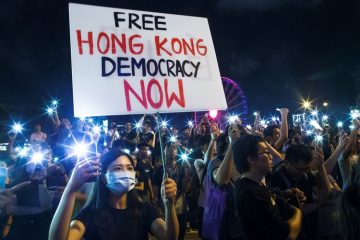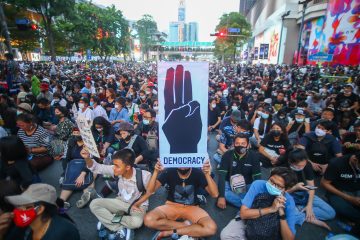
From the Parole Guerriere to Electoral Success: Italy’s Five Star Movement
The Five Star Movement is one of the most interesting political ‘experiments’ on political landscape of Western democracies. Once again Italy, which with Berlusconi has experienced Trumpism before Donald Trump, is a political laboratory for novel political phenomena that the world looks at, with a mixture of concern and excitement, to learn something about the future of our democratic systems. Only five years ago Beppe Grillo, a stand-up comedian and the founder of the Five Star Movement (M5S), launched his parole guerriere (warlike words) and M5S obtained a remarkable 25% of the national vote in its first electoral showing. Italian voters again expressed loudly and clearly their preference for the Five Star Movement in last weekend’s general election. The M5S not …

Assessing the Performance of Minority Governments in Europe: The Devil is in the Detail
In 1974, when Harold Wilson formed the UK’s first minority government in 45 years, observers like Anthony King optimistically claimed that “[m]inority rule can work”. This challenges the oft-cited view of Strøm that minority governments are “counterintuitive phenomen[a] in the world of parliamentary democracy”. Today, minority governments constitute approximately one third of governments in established parliamentary democracies, globally. This ‘counterintuitive’ statistic raises the following questions: When can minority rule work? Under which conditions are minority cabinets effective? How have minority rule governments evolved over time? To answer these questions, I focus on three cases – Sweden, Norway, and Denmark – where minority cabinets are the predominant form of government. Ultimately, I argue that existing measures to assess the performance of …

A Race Against Time: The Public Safety Crisis in Brazil
According to a recent national survey on crime and victimisation in Brazil, more than fifty per cent of respondents reported having been robbed at least once, while 85 per cent know at least one other person who has been victim of the same crime. Latinobarómetro data from 2023 shows that 59 per cent of Brazilian respondents are worried “all the time” about becoming a crime victim. Such alarming numbers are just the tip of the iceberg when it comes to crime and violence in the largest country in the Southern hemisphere. Results from the most recent National Transport Confederation (Conferederação Brasileira do Transporte, CNT) national poll conducted in mid-January 2024 clearly indicate public safety as the major challenge to be …

Can the Pro-Democracy Hong Kong Lobby Still Influence Western Foreign Policy?
During the 2019 Anti-Extradition Bill protests in Hong Kong, activists made extensive efforts to internationalize their movement, engaging in public diplomacy and lobbying foreign governments to support their cause. The Hong Kong pro-democracy lobby—a loose coalition of individuals and organizations aiming to steer Western foreign policy in a direction they believe will benefit Hong Kong’s democratic prospects—emerged amidst this unprecedented grassroots mobilization. Four years on, however, the Hong Kong lobby is facing an uncertain future. Activists are striving to overcome the barriers posed by transnational repression and reinvent their image in today’s fraught geopolitical landscape. Two factors explain the success of Hong Kong activists in constructing and consolidating their lobbying infrastructure in 2019. First, the expansion and transformation of the …

Review of Alt-Finance: How the City of London Bought Democracy by Marlène Benquet and Théo Bourgeron (Pluto Press, 2022)
For years academic literature and broader public debates have largely framed the Brexit referendum as a ‘popular revolt against the elites’. While some emphasised the role of economic factors and others boiled it down to anti-immigration attitudes, most accounts seem to converge around this bottom-up perspective that ordinary people disillusioned with the elites have driven the UK out of the EU. Conversely, apart from a few dissenting voices, the idea that economic elites have been mostly opposed to Brexit has been the prevailing view in the literature. Challenging the over-emphasis on the voting process, Marlène Benquet (University of Paris Dauphine) and Théo Bourgeron (University of Edinburgh) invite us to look more closely at the role played by the economic interests …

OxPol Blogcast. Women in Politics – In Conversation with Rachel Bernhard: Can Gender-Typical Appearance and Behaviour Help Candidates Win Office?
OxPol Blogcast showcases research, analysis, insights, and experiences from the members of the University of Oxford’s Department of Politics and International Relations (DPIR), and specialist guests from the Oxford academic community and beyond. Are masculine behaviour and appearance among the prerequisites for electoral success, in line with popular belief? On this episode, OxPol Blogcast host Anastasia Bektimirova is joined by Dr. Rachel Bernhard, an Associate Professor at the University of Oxford’s Department of Politics and International Relations (DPIR), to put the view of the political arena as a place favouring conventionally masculine traits to a test. Focusing on the United States, Rachel explains what is understood as masculinity and femininity in political leadership, and guides us through the observed variation in voters’ response to those cues. We also discuss …

Brazil is back: Will Lula Manage to Rebuild Brazil’s Environmental Policy?
Lula signalled new winds for Brazilian climate politics in his victory speech after winning the presidential election. In his words: “Brazil is ready to retake its leadership in the fight against the climate crisis, by protecting all its biomass, especially the Amazon rainforest”. During Lula’s first presidential mandate at the beginning of the 2000s, Brazil, and other countries led by progressive leaders across Latin America, expanded mega extractive projects to fund their distributive politics. These projects are responsible for environmental degradation and threats to local people’s health and lives until this day. However, Lula also has also great achievements. Between 2005 and 2012, Brazil registered the lowest illegal deforestation in the Amazon as a result of the implementation of the …

What is peripheral about Thai (democratic) politics?
The latest mass uprisings in Thailand have driven a wedge between people who remained complacent towards the status quo and people who sought to upend what they saw as conservative authoritarianism by resorting to rally politics. The latter wished to take matters into their own hands and steer the country in a more democratic direction as faith in mainstream political actors dwindled. Should marginalized civil-society actors not take drastic measures, future political trajectories will remain shrouded in conservative mist. A military coup in 2014 had enabled the conservative establishment to tighten its grip on the country’s politics. This is not a one-off incident but a recurring pattern in Thailand’s modern history. Via military coups, conservative forces have always found a …

Who governs? When and why governments appoint technocrats?
One of the most critical questions of modern comparative politics is: who governs? The first thing that would come to mind would be party politicians. However, transformations in several European countries’ governmental arena indicate that partisan presence in office, and, more broadly, the general model of party government, characterised by parties’ centrality in representing the needs and demands of citizens, is in decay. Such a decline owes much to the increased government involvement of technocratic personnel – i.e., ministers with no political affiliation. Indeed, while Italy established itself as the promised land of technocracy, currently led by Mario Draghi and by four technocratic prime ministers in the last two decades, technocratic ministers have also entered the last three partisan governments …








